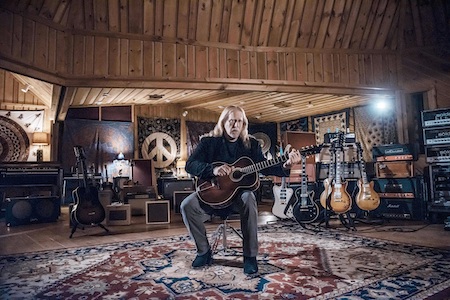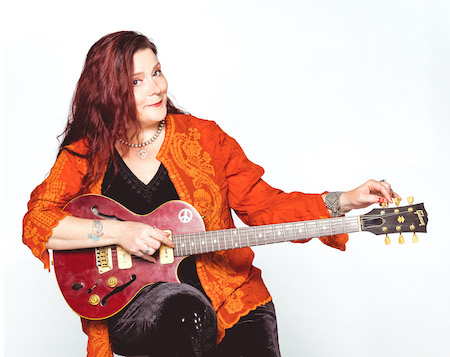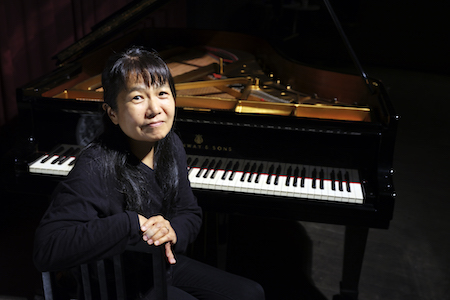Jan 13, 2026 2:09 PM
More Trump-Kennedy Center Cancellations
The fallout from the renaming of the John F. Kennedy Center for the Performing Arts to include President Donald…

“We used all vintage gear to add even more authenticity to the sonic picture,” Haynes said of his new blues album.
(Photo: Jay Sansone)Warren Haynes: ‘The First Sound That Moved Me’
At last, Warren Haynes is carrying the banner of the blues. For the first time in the long life of his jam band Gov’t Mule, the guitarist has hunkered down and recorded a blues album called Heavy Load Blues (Fantasy).
Haynes isn’t a recent convert to the cause. The blues had meaning for him way back. “The first sound that moved me, stirred up something emotionally inside me,” he said, “was Black gospel music coming over the radio when I was growing up in Asheville, North Carolina, in the 1970s. I must have been 6 or 7. As we know, the blues was born out of Black gospel music and most everything I love, musically speaking, was fully or to some extent born out of the blues. That would include soul music, rock, jazz, R&B, reggae — all of which along with blues music I have listened to and studied my entire life.”
Since starting up in 1994, Gov’t Mule has occasionally performed arrangements of traditional blues songs during live stage shows, and recorded a few bluesy numbers on a handful of the band’s 20-plus albums. Why a full-bore blues album now?
“I’ve been thinking about this for several years,” Haynes explained, “and I even started compiling a list of cover songs that I thought would be fun to tackle when the time came. Being locked down for a year-and-a-half, I found myself writing more music than I have in decades and that included a handful of blues songs. So, I think that all of those things combined, along with going through the same emotional, psychological and even physical challenges we were all faced with, sort of forced my hand and made me want to move the concept of making a blues record to the front burner.”
The live-in-the-studio approach to recording was right in Haynes’ wheelhouse for getting the right blues vibe. The four musicians, who didn’t wear headphones, were situated close to each other in a small studio, with every instrument bleeding into every microphone.
“I can’t imagine making a blues record any other way,” he said. “Blues is all about the interaction in the moment, and everything Gov’t Mule does tends to adopt a blues or jazz philosophy in the way that even the more structured songs depend on that interaction. Every note or phrase any of us plays is based on hearing what someone else just played or sang and responding accordingly.
“We used all vintage gear to add even more authenticity to the sonic picture,” Haynes added. “I played a bunch of different vintage guitars through a bunch of small, vintage amps and even ran the vocal through an amp to make it sound more like those old records from 1955 to 1975, which is my favorite era of blues recordings.”
“Once we made the decision to make a blues record, it was important to me that any of the original songs that we recorded stand up alongside the covers by the classic artists,” Haynes said. “Some of them changed accordingly during the recording process. For example, when I first wrote ‘Wake Up Dead’ it was at a much slower tempo. When I showed it to the band, they started batting around different ideas, which is what we do, and at some point it just fell into this uptempo groove.”
Songs linked to Howlin’ Wolf, Elmore James, Junior Wells and Tom Waits are what he called “select faves by my favorite artists.” Haynes’ makeover of Wells’ “Snatch It Back,” in particular, sounds like a Gov’t Mule concert. “The original version is only 2:49 long, so we decided to stretch it out by incorporating this instrumental jam in the middle, then going back to the melody. We discussed it briefly and recorded the first take, which turned out to be the keeper version.” —Frank-John Hadley

Caroline Wonderland’s Traveling Blues
Carolyn Wonderland is doing just fine. She has joined the roster of Alligator, the premier blues label, with a new album titled Tempting Fate. And playing as a member of John Mayall’s Bluesbreakers for the past three years has attracted scads of admirers around the globe.
No overnight sensation, Wonderland has worked hard for more than three decades, performing thousands of gigs on the road or in her home city of Austin, Texas. Again and again, she has proven her dedication to a musical vision that owes something to the catholic “American Music, Texas Style” created by the late guitarist-fiddler Gatemouth Brown.
“I’m happily all over the map,” she said. “Certainly the Texas part of the map is well worn, anyway. I love so many kinds of songs and different music. The genre-less approach feels more honest to me. I love how bands like Los Lobos, Gatemouth Brown, Billy Joe Shaver, Freddie King, Doug Sahm and Marcia Ball can play any style and still resonate with their distinctive voices.”
Blues styles mean a lot to her. “The blues is both personal and universal, simple and sophisticated, but above all, honest. You cannot be insincere when playing in the blues tradition because you are as naked as can be. It is not a museum piece and therefore is constantly evolving, but there is a foot in the past stepping in traditions. It’s one of America’s finest contributions to the great music tapestry that is now universally drawn from.”
On the road with blues legend Mayall, who’d never before employed a female guitarist in his band, Wonderland wrote songs that roam across genre boundaries. She accumulated enough to start thinking about recording them on her next break from touring.
“I was up in Woodstock, New York,” she recalled, “discussing my plans for an album with my dear friend Cindy Cashdollar. She knew I had no label, just songs and ideas. Cindy asked who I might be thinking of as a producer and I kinda blurted out: In a perfect world, I’d ask Dave Alvin to do it. I felt he would be a sympathetic ear to my slightly eclectic approach to songs. Cindy called him then and there, and he said yes. I was — and still am — over the moon about this turn of events.”
Before long, Wonderland and Alvin, a roots-rock dignitary, met up in an Austin studio. Original songs like “Broken Hearted Blues” were a cinch to put down, while others, notably the political “Fragile Peace And Certain War,” took more consideration. “The lyrics,” she revealed, “took some time to go from being blurted out in tears to being refined into some truths worth saying.”
Wonderland had a wish list of guests. “A neat trick to making a record is to track in January when friends are less likely to be on tour, so you can get them all to come jam with you,” she said.
These friends included lap steel guitarist Cashdollar, keyboardist Red Young and “ethereal, so deeply cool” country singer Jimmie Dale Gilmore. “We covered a lot of ground and had a nice journey along that map,” Wonderland said.
Her good fortune continued. “I’m a touring musician, always have been, and I really don’t know how to do much else in the business but to drive, play, sleep, repeat. So, I just sat on Tempting Fate wondering what was next. Then, out of the blue, I get a call from Alligator’s Bruce Iglauer.
“He says he understands I might have something he’d like to hear, and, boy, I was thrilled to send him the recordings! I hoped he’d like the music. Turns out, he did.” —Frank-John Hadley

Satoko Fujii: Fusion of the Blues
The blues is a personal music. But what does it mean to someone born far from America, working in a very different realm of sound. To get an opinion, DownBeat asked Satoko Fujii.
When the pianist/composer came to the U.S. from Japan to study at Berklee College of Music in the mid-1980s, she found herself surrounded by American students who’d cut their teeth on blues-based music. Adept in the musical languages she’d learned in Japan — jazz, classical, Japanese folk — the blues escaped her.
“For me, the blue note is flat three, flat five or flat seven,” she said in a Zoom chat from Tokyo. “I had that knowledge, but I couldn’t get the feeling of the blues. I had to learn it.”
Learning the blues wasn’t easy, Fujii admits, but she took away some pivotal insights: Musical ideas come from everywhere. And artistry lies in the inventiveness with which the composer fuses those ideas.
“The blues is a kind of fusion music, like jazz is,” she said. “My music is jazz, even if some people don’t think so. I make my music from the many things that I have heard so far.”
She recalled her first big band album in the U.S., South Wind (Leo Lab), in 1997. For this record, she built her compositions around the Okinawan version of the pentatonic scale, with its subtly enticing flat five. Accustomed to the pentatonic scale of European classical music, the American musicians in her band had trouble finding the right feel.
“I grew up hearing Okinawa music, so I already knew how to use it,” she said. “But I saw extraordinary American musicians struggling with that scale. And I remembered how it was for me to study the blues.”
Last year, frustrated with the lack of performance opportunities, Fujii began to record freely improvised music at a distance, learning new technologies that required modifications to the way she usually plays. In November, she released two remotely recorded albums on Libra Records, her imprint with trumpeter (and husband) Natsuki Tamura.
To lay down the five tracks for Mosaic, with her trio This Is It!, Fujii and Tamura squeezed into a small, sound-proofed practice room in their home. The group’s drummer, Takashi Itani, lived 400 miles away, however, so they recorded via the internet, wearing headphones. The trio synchronized without any kinesthetic or visual input — a potentially disruptive set-up for these deeply intuitive improvisatory compositions.
On her second 2020 album Underground — a vehicle for her duo Futari, with vibraphonist Taiko Saito — Fujii employed a different tack. She and Saito, who lives in Berlin, each recorded in isolation. They then swapped audio files, experimenting and adjusting until reaching agreement on the best interpretation of each composition.
This approach also worked: The two players seem of one mind, from the turbulence of the title cut, through the screeching vocals of “One Note Techno Punks.” It’s easy to forget that a continent lies between them.
“So many musicians think music should be made in the same room, and some musicians think remotely making music is wrong,” Fujii observed. “But I like doing everything. I need freedom, especially in making music.” —Suzanne Lorge

Belá Fleck during an interview with Fredrika Whitfield on CNN.
Jan 13, 2026 2:09 PM
The fallout from the renaming of the John F. Kennedy Center for the Performing Arts to include President Donald…

Peplowski first came to prominence in legacy swing bands, including the final iteration of the Benny Goodman Orchestra, before beginning a solo career in the late 1980s.
Feb 3, 2026 12:10 AM
Ken Peplowski, a clarinetist and tenor saxophonist who straddled the worlds of traditional and modern jazz, died Feb. 2…

The success of Oregon’s first album, 1971’s Music Of Another Present Era, allowed Towner to establish a solo career.
Jan 19, 2026 5:02 PM
Ralph Towner, a guitarist and composer who blended multiple genres, including jazz — and throughout them all remained…

Rico’s Anti-Microbial Instrument Swab
Jan 19, 2026 2:48 PM
With this year’s NAMM Show right around the corner, we can look forward to plenty of new and innovative instruments…

Richie Beirach was particularly renowned for his approach to chromatic harmony, which he used to improvise reharmonizations of originals and standards.
Jan 27, 2026 11:19 AM
Richie Beirach, a pianist and composer who channeled a knowledge of modern classical music into his jazz practice,…